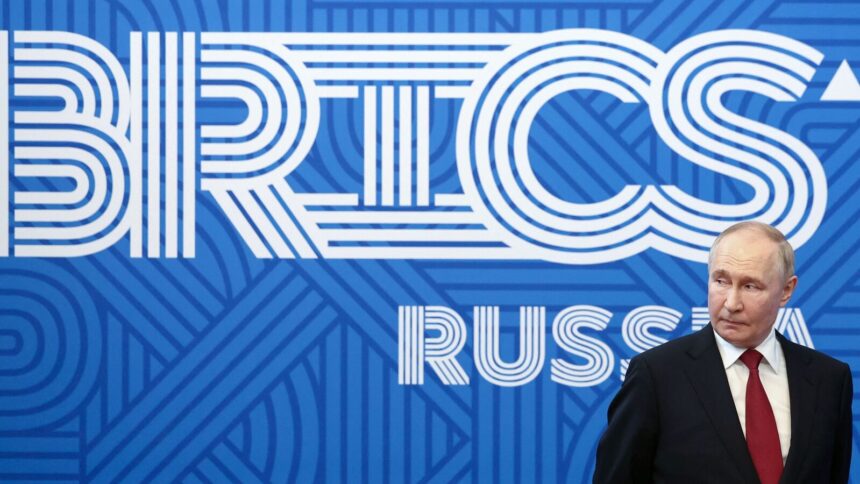In their 15th year together, the original BRICS (Brazil, Russia, India, China, and South Africa) have not achieved much. However, at this summit, Mr. Putin aims to give the bloc more weight by proposing the creation of a new global financial payments system to challenge America’s dominance in global finance and protect Russia and its allies from sanctions. “Everyone understands that anyone may face US or other Western sanctions,” Sergei Lavrov, Russia’s foreign minister, stated last month. A BRICS payments system, dubbed “BRICS-Bridge” by Russia, is expected to be constructed within a year. This system would allow countries to conduct cross-border settlements using digital platforms operated by their central banks. Controversially, it may borrow concepts from another project called mBridge, partially managed by the Bank for International Settlements (BIS).
The discussions will shed light on the race to reshape the world’s financial infrastructure. China has long believed that payments technology, rather than a creditors’ revolt or military conflict, will diminish America’s power derived from being the center of global finance. The BRICS initiative could result in more cost-effective and faster transactions.
These advantages might be sufficient to attract emerging economies. Western officials are cautious that the scheme may be designed to circumvent sanctions. Some are also frustrated by the unintended involvement of the BIS, a Swiss-based organization known as the central bank for central banks.
America’s supremacy in the global financial system has been a cornerstone of the post-war order. This dominance results from its economic and military strength, as well as the perception that dollar-denominated assets like Treasuries are secure from government confiscation and inflation, and are simple to buy and sell. While central banks have diversified their holdings, with around 58% of foreign-currency reserves in dollars, the network effects of the dollar place American banks at the heart of the world’s payment systems.
The dominance of the dollar provides what scholars Henry Farrell and Abraham Newman call “panopticon” and “choke point” effects. Because almost all dollar transactions must pass through a correspondent bank in America, the country can monitor flows for signs of terrorist financing and sanctions evasion.
This leverage provides American leaders with a potent tool—one they prefer using in place of direct military action. The number of individuals subject to American sanctions increased by more than 900% in the two decades leading up to 2021, totaling around 9,400. Following Russia’s invasion of Ukraine, a harsh financial assault was launched, freezing $282 billion of Russian assets held abroad, disconnecting Russian banks from SWIFT, and halting their ability to process payments through American banks.
This intense pressure on Russia has spurred America’s adversaries to expedite efforts to move away from the dollar, prompting many other governments to reevaluate their reliance on American finance. China perceives this reliance as one of its major vulnerabilities.
At the BRICS summit, Mr. Putin aims to capitalize on discontent with the dollar. For him, creating a new payment system is both an urgent practical necessity and a geopolitical strategy. Russia’s foreign exchange markets mainly trade in yuan, but due to insufficient currency to cover all import costs, Russia has resorted to bartering goods. Mr. Putin advocates for establishing a common BRICS currency for trade pricing, based on a basket of gold and non-dollar currencies, although Indian officials have recently expressed objections to this proposal.
The most significant initiative involves utilizing digital currencies backed by fiat currencies, placing central banks, not correspondent banks reliant on America’s dollar clearing system, at the center of cross-border transactions. By decentralizing the financial system, this proposal could prevent any single country from severing connections with another. Commercial banks would transact via their central banks, eliminating the need to maintain bilateral relations with foreign banks, thereby bypassing the network effects of the current correspondent banking system.
The “BRICS Bridge” plan was detailed in a 48-page report by the Russian finance ministry and central bank in October. With a focus on digital currencies managed by central banks, the plan appears to draw inspiration from an experimental payments platform called mBridge, developed by the BIS in cooperation with the central banks of China, Hong Kong, Thailand, and the United Arab Emirates.
The BIS project, initiated in 2019 before Russia’s invasion, has been highly successful in cutting transaction times and costs substantially. This unintentional challenge to the dollar’s dominance poses a complex geopolitical situation. The efficiency gains of new digital currencies may diminish the dollar’s usage in cross-border trade, potentially bolstering China’s currency.
The possibility that the concepts and technology behind the mBridge project could be replicated by the BRICS, China, or Russia is a concern. While the BIS sees mBridge as a collaborative effort and retains ultimate decision-making authority over membership, some Western officials suggest that participants in the trial could share intellectual capital with others, including those involved in the BRICS Bridge.
The BRICS entry into the payments race represents the emerging geopolitical challenges faced by multilateral organizations. As different members pursue conflicting objectives, maintaining neutrality becomes increasingly challenging. Despite the complexity, the BIS asserts its role in solving global problems for all countries, irrespective of differing agendas.
One approach for America and its allies is to hinder new payment systems that compete with the dollar. Western officials caution the BIS that the project might be exploited by countries with malicious intentions. Consequently, the BIS has slowed down its work on mBridge and is unlikely to accept new participants.
In addition to impeding potential competitors, another strategy is to enhance the efficiency of the dollar-based system to match that of new rivals. America is already gearing up to compete by joining a BIS project to improve the existing system’s speed and cost-effectiveness. The Federal Reserve may also connect its domestic instant payments system with international counterparts.
Despite these initiatives, any rival BRICS payments system will face significant obstacles. Ensuring liquidity without substantial government subsidies will be challenging. Additionally, distrust between members, imbalanced capital and trade flows, and the need for complex rules governing settlement and financial crime in a digital currency system could impede progress.
Nevertheless, momentum is building behind the BRICS initiative as a significant number of central banks worldwide are experimenting with digital currencies for both domestic and cross-border transactions. The desire to overhaul the current cross-border payments system is strong, with some countries aiming to entirely replace the existing structure.
While the BRICS scheme may encounter formidable hurdles, the dissatisfaction with the current system may propel it forward. The upcoming BRICS summit, set in Brazil and chaired by President Luiz Inácio Lula da Silva, who questions the necessity of basing all trade on the dollar, indicates a growing global sentiment for change in the financial realm.










